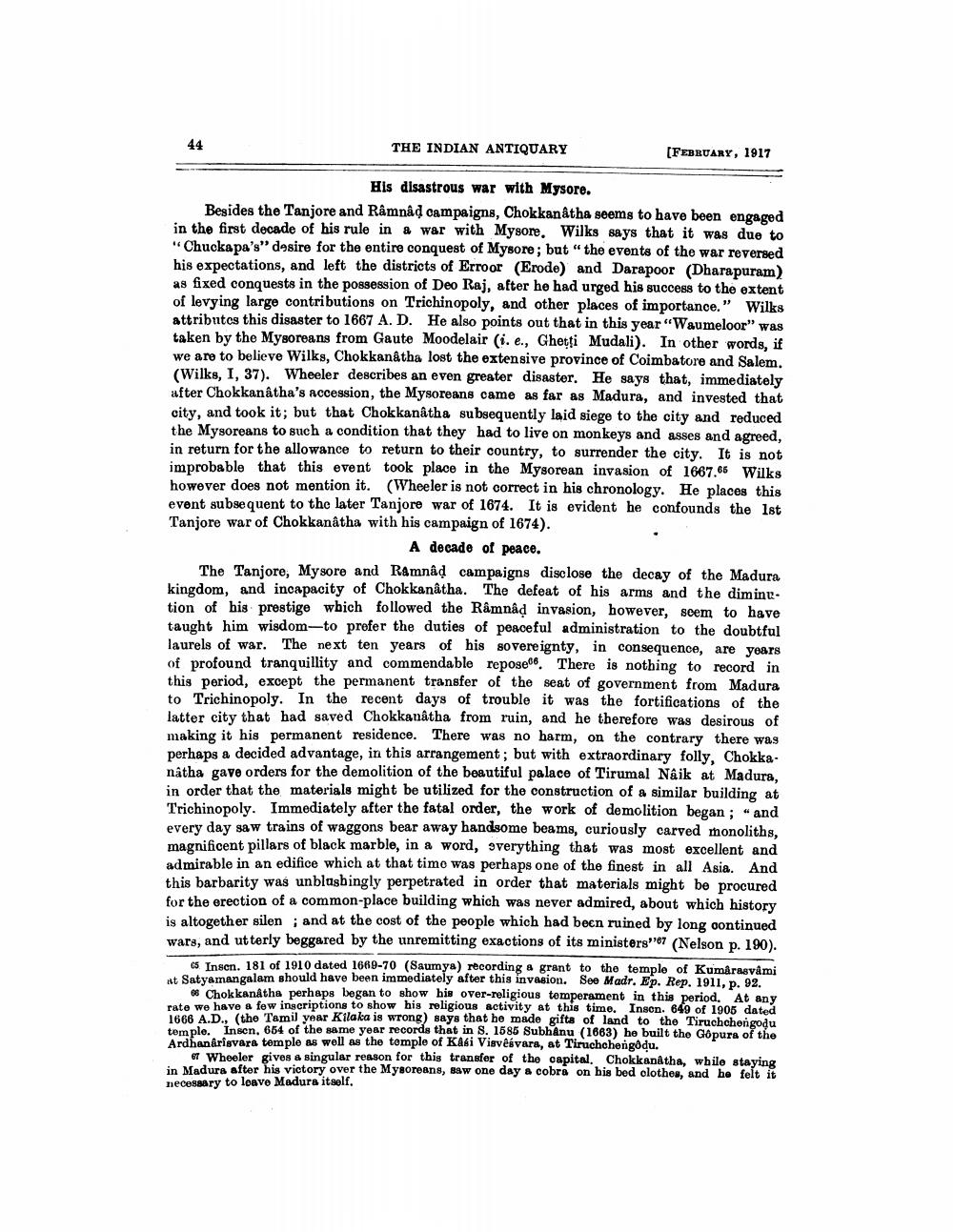________________
THE INDIAN ANTIQUARY
(FEBRUARY, 1917
His disastrous war with Mysore. Besides the Tanjore and Râmnâd campaigns, Chokkanátha seems to have been engaged in the first decade of his rule in a war with Mysore. Wilks says that it was due to "Chuckapa's" desire for the entire conquest of Mysore; but "the events of the war reversed his expectations, and left the districts of Erroor (Erode) and Darapoor (Dharapuram) as fixed conquests in the possession of Deo Raj, after he had urged his success to the extent of levying large contributions on Trichinopoly, and other places of importance." Wilks attributes this disaster to 1667 A. D. He also points out that in this year"Waumeloor" was taken by the Mysoreans from Gaute Moodelair (i. e., Ghetti Mudali). In other words, if we are to believe Wilks, Chokkanátha lost the extensive province of Coimbatore and Salem. (Wilks, I, 37). Wheeler describes an even greater disaster. He says that, immediately after Chokkanatha's accession, the Mysoreans came as far as Madura, and invested that city, and took it; but that Chokkanatha subsequently laid siege to the city and reduced the Mysoreans to such a condition that they had to live on monkeys and asses and agreed, in return for the allowance to return to their country, to surrender the city. It is not improbable that this event took place in the Mysorean invasion of 1667.65 Wilks however does not mention it. (Wheeler is not correct in his chronology. He places this event subsequent to the later Tanjore war of 1674. It is evident he confounds the 1st Tanjore war of Chokkanatha with his campaign of 1674).
A decade of peace. The Tanjore, Mysore and Ramnâd campaigns disclose the decay of the Madura kingdom, and incapacity of Chokkanatha. The defeat of his arms and the dimingtion of his prestige which followed the Râmnad invasion, however, seem to have taught him wisdom-to prefer the duties of peaceful administration to the doubtful laurels of war. The next ten years of his sovereignty, in consequence, are years of profound tranquillity and commendable repose. There is nothing to record in this period, except the permanent transfer of the seat of government from Madura to Trichinopoly. In the recent days of trouble it was the fortifications of the latter city that had saved Chokkanatha from ruin, and he therefore was desirous of making it his permanent residence. There was no harm, on the contrary there was perhaps a decided advantage, in this arrangement; but with extraordinary folly, Chokkanátha gave orders for the demolition of the beautiful palace of Tirumal Naik at Madura, in order that the materials might be utilized for the construction of a similar building at Trichinopoly. Immediately after the fatal order, the work of demolition began; "and every day saw trains of waggons bear away handsome beams, curiously carved monoliths, magnificent pillars of black marble, in a word, verything that was most excellent and admirable in an edifice which at that timo was perhaps one of the finest in all Asia. And this barbarity was unblugbingly perpetrated in order that materials might be procured for the erection of a common-place building which was never admired, about which history is altogether silen; and at the cost of the people which had been ruined by long oontinued wars, and utterly beggared by the unremitting exactions of its ministers"7 (Nelson p. 190).
cs Insen. 181 of 1910 dated 1669-70 (Saumya) recording a grant to the temple of Kumârasvami at Satyamangalam should have been immediately after this inva
am should have been immediately after this invasion. See Madr. Ep. Rep. 1911, p. 92. Chokkanátha perhaps began to show his over-religious temperament in this period. At any rate we have a few inscriptions to show his religious activity at this time. Inson. 640 of 1906 dated 1668 A.D.. (the Tamil year Kilaka 18 wrong) says that he made gifta of land to the Tiruchchangu tample. Insen, 664 of the same year records that in S. 1585 Subhanu (1663) be built the Gópurs of the Ardhanarisvara temple as well as the temple of Kasi Visvēsvara, at Tiruchchengodu.
e Wheeler gives & singular reason for this transfer of the capital. Chokkanátha, while staying in Madura after his victory over the Mysoreans, saw one day a cobra on his bed olothes, and be felt it necessary to leave Madure itself.




